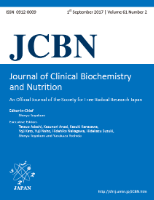
JOURNAL OF CLINICAL BIOCHEMISTRY AND NUTRITION
Scope & Guideline
Cultivating a Deeper Understanding of Biochemical Interactions
Introduction
Aims and Scopes
- Clinical Biochemistry:
Research related to biochemical markers and their relationships with diseases, highlighting the biochemical mechanisms of various health conditions. - Nutrition and Metabolism:
Studies investigating the impacts of dietary components and nutrition on metabolic pathways, health conditions, and disease prevention. - Oxidative Stress and Antioxidants:
Exploration of oxidative stress mechanisms in diseases and the role of antioxidants in mitigating these effects. - Microbiota and Gut Health:
Research that examines the connections between gut microbiota composition, dietary factors, and overall health, including disease associations. - Chronic Disease Management:
Investigations into how nutrition can influence chronic diseases such as diabetes, obesity, and cardiovascular diseases, aiming for better management and prevention strategies. - Innovative Nutritional Interventions:
Studies focused on novel dietary supplements, functional foods, and their effects on health outcomes, particularly in specific populations.
Trending and Emerging
- Personalized Nutrition:
There is a growing interest in personalized dietary interventions tailored to individual genetic, metabolic, and microbiota profiles, indicating a shift towards precision nutrition. - Role of Gut Microbiota in Health:
Research on the gut microbiome's influence on health and disease is increasingly prominent, with studies linking microbiota composition to various health outcomes. - Nutritional Interventions in Chronic Diseases:
Emerging studies focus on specific nutritional strategies aimed at managing chronic diseases like diabetes, obesity, and cardiovascular diseases, emphasizing evidence-based interventions. - Biochemical Mechanisms of Dietary Components:
More publications are exploring the biochemical mechanisms through which dietary components exert their effects on health, bridging the gap between nutrition and clinical biochemistry. - Impact of Nutrition on Mental Health:
Research examining the relationship between nutrition and mental health outcomes is gaining traction, reflecting a broader understanding of the mind-body connection.
Declining or Waning
- Traditional Nutritional Studies:
Research focusing solely on traditional dietary assessments and food intake surveys appears to be less prominent, possibly overshadowed by more mechanistic and biochemical studies. - Animal Model Studies:
While animal studies remain important, there seems to be a reduction in the number of publications solely relying on animal models without subsequent human studies. - General Nutritional Guidelines:
Publications that focus on broad dietary guidelines without specific biochemical or clinical implications are becoming less common, indicating a shift towards more targeted, evidence-based nutritional research. - Basic Nutritional Biochemistry:
Research that does not connect basic biochemical findings to clinical applications or health outcomes is on the decline, as the journal increasingly emphasizes translational research.
Similar Journals

NUTRITIONAL NEUROSCIENCE
Advancing Insights: The Impact of Nutrition on Brain HealthNUTRITIONAL NEUROSCIENCE, published by Taylor & Francis Ltd, is an eminent journal in the fields of nutrition and neuroscience, dedicated to advancing our understanding of how nutritional factors influence brain function and behavior. With an impressive impact factor and ranking in the top quartiles for various related categories—including Q1 in Medicine (miscellaneous) and Q2 in both Neuroscience and Nutrition & Dietetics—this journal positions itself as a vital resource for researchers, practitioners, and students alike. Since its inception in 1998, NUTRITIONAL NEUROSCIENCE has provided a platform for high-quality peer-reviewed articles that explore the intersection of nutrition, health, and neurological sciences, aiding in the dissemination of knowledge and fostering scientific collaborations. The journal is particularly noted for its accessibility, encouraging open discussion and exploration of innovative therapeutic strategies within the scope of nutritional neuroscience.
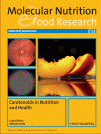
MOLECULAR NUTRITION & FOOD RESEARCH
Advancing the Science of Nutrition and Food Innovation.MOLECULAR NUTRITION & FOOD RESEARCH, published by Wiley, is a premier journal dedicated to the rapidly evolving field of food science and nutrition. With an impressive impact factor and a consistent position in the Q1 category for both Biotechnology and Food Science in 2023, this journal stands out as a leading platform for researchers, professionals, and students alike. The scope encompasses a comprehensive range of topics from molecular nutrition to innovative food research, with a focus on translating scientific insights into practical applications that enhance human health. As part of its commitment to accessibility, the journal offers open access options, allowing for wider dissemination and engagement with the academic community. Given its high ranking in Scopus—placing 42nd in Food Science and 62nd in Biotechnology—the journal plays a critical role in advancing knowledge and fostering collaboration in these essential fields. For over two decades, it has provided a vital forum for cutting-edge research, ensuring that each issue contributes significantly to the discourse around food and nutrition.
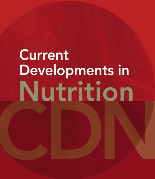
Current Developments in Nutrition
Advancing the frontiers of nutritional science.Current Developments in Nutrition is a prominent open-access journal published by Elsevier Science Inc, specializing in the field of nutritional science. With an ISSN of 2475-2991, this journal has been contributing valuable insights to the scientific community since its inception in 2017, and continues to shape research narratives through 2024. It boasts impressive rankings in the 2023 quartiles, achieving Q1 in Food Science and Q2 in both Medicine (miscellaneous) and Nutrition and Dietetics, highlighting its critical role in advancing knowledge in these areas. The journal is particularly noted for its commitment to disseminating cutting-edge research that influences dietary practices and public health policies. With Scopus rankings placing it in the 75th percentile in Medicine and the 68th percentile in Food Science, Current Developments in Nutrition serves as an essential resource for researchers, healthcare professionals, and students who seek to stay at the forefront of nutrition science. Its open-access model ensures that groundbreaking studies are available to a global audience, further enhancing collaboration and innovation across disciplines.

Frontiers in Nutrition
Driving progress in nutrition for healthier populations.Frontiers in Nutrition, published by FRONTIERS MEDIA SA, is a leading open access journal dedicated to advancing the field of nutrition through rigorous research and innovative insights. Since its inception in 2014, it has established itself as a key resource for researchers, healthcare professionals, and policymakers interested in the multidimensional aspects of nutrition and its impact on health and disease. The journal boasts a commendable reputation with a quartile ranking of Q1 in Food Science and multiple Q2 rankings in Endocrinology, Diabetes and Metabolism, as well as Nutrition and Dietetics, reflecting its high-quality contributions to the scientific community. With an accessible platform that ensures the wide dissemination of knowledge, Frontiers in Nutrition is committed to fostering collaboration among experts and promoting findings that can lead to healthier populations worldwide. The journal encourages submissions that address the complex interplay between nutrition and health, thus bridging the gap between research and practical application. Join us in exploring how nutrition can enhance well-being and address global health challenges.
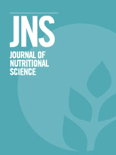
Journal of Nutritional Science
Connecting researchers to revolutionize nutritional science.The Journal of Nutritional Science, published by Cambridge University Press, is a leading open-access journal dedicated to the field of nutrition and dietary research. Established in 2012, this journal aims to disseminate high-quality research on nutrition, dietetics, and their implications for health and disease. With an impact factor reflective of its growing importance—holding Q2 and Q3 rankings in relevant categories such as Nutrition and Dietetics and Endocrinology—the journal serves as a vital platform for researchers, professionals, and students interested in evidence-based advancements within the nutritional sciences. The Journal of Nutritional Science is based in the United Kingdom and leverages a global network of experts to foster discussions that drive innovation in food science and health policies. By enabling open access to its content, it ensures that critical knowledge is readily available to the academic community and beyond, promoting a healthier, more informed society.
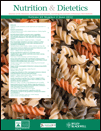
Nutrition & Dietetics
Innovating Dietary Solutions for Modern ChallengesNutrition & Dietetics is a premier peer-reviewed journal published by WILEY that serves as a key resource for researchers, professionals, and students in the fields of nutrition, dietetics, and public health. With its ISSN 1446-6368 and E-ISSN 1747-0080, the journal focuses on disseminating high-quality research that addresses contemporary issues in food science, dietary practices, and nutritional health. Ranked in the Q2 category in both Nutrition and Dietetics and Public Health for the year 2023, it enjoys an impressive standing within its scientific community, reflected in Scopus ranks placing it in the top percentile of its categories. Although not an Open Access journal, readers can access a wealth of knowledge from studies converging from 2006 to 2024. The journal's commitment to advancing evidence-based practices makes it indispensable for those engaged in bridging the gap between nutrition science and practical application, while it continues to evolve alongside emerging research and global health trends.
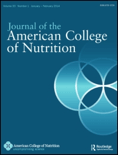
JOURNAL OF THE AMERICAN COLLEGE OF NUTRITION
Shaping the Future of Nutrition and DieteticsThe Journal of the American College of Nutrition, published by Routledge Journals, Taylor & Francis Ltd, is a respected platform in the fields of Nutrition and Dietetics as well as Medicine. With an ISSN of 0731-5724 and an E-ISSN of 1541-1087, this journal plays a pivotal role in disseminating cutting-edge research and innovative practices related to nutritional science and health. Recognized for its significant impact, it holds a Q2 ranking in both Medicine (miscellaneous) and Nutrition and Dietetics, positioning it in the 86th and 85th percentiles respectively among global publications. Although the journal's coverage in Scopus has been discontinued as of 2021, it continues to serve the academic community by providing access to key studies and impactful findings. Based in the United Kingdom, this journal aims to bridge the gap between research and practice, supporting professionals, researchers, and students in advancing their understanding of nutrition's critical role in health and disease management.
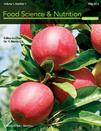
Food Science & Nutrition
Championing open access to vital food and nutrition research.Food Science & Nutrition is an esteemed peer-reviewed journal published by WILEY, dedicated to advancing the fields of food science and nutritional research. With an impressive impact factor and a prestigious Q1 ranking in the Food Science category, this journal stands out as a leading platform for innovative research, offering meaningful insights into the relationship between food composition and health outcomes. Since its transition to Open Access in 2013, Food Science & Nutrition has championed the global dissemination of knowledge, ensuring that vital research is accessible to researchers, professionals, and students alike. With a vast scope that encompasses both agricultural and biological sciences, the journal provides a comprehensive view of emerging trends, methodologies, and applications in food security and nutrition, making it indispensable for those invested in these critical areas.

Advances in Nutrition
Advancing Nutritional Science for Tomorrow's HealthAdvances in Nutrition is a premier academic journal published by Elsevier Science Inc, dedicated to advancing the field of nutritional science through rigorous research and critical reviews. Since its inception in 2010, this influential journal has positioned itself at the forefront of its discipline, boasting an impressive Q1 ranking in Food Science, Medicine (miscellaneous), and Nutrition and Dietetics as of 2023. With its robust impact factor and distinguished standing, it ranks within the top percentiles of its categories, making it a vital resource for researchers, professionals, and students alike. The scope of the journal encompasses a diverse range of topics related to nutrition, providing a platform for innovative research that influences dietary practices and public health policies. Although this journal currently does not offer open access, it remains accessible through institutional subscriptions, enhancing its outreach and impact in the scientific community.

Animal Nutrition
Unlocking the Secrets of Nutritional Science for AnimalsAnimal Nutrition is a premier open-access journal dedicated to advancing the understanding of nutritional science in animals, published by KEAI PUBLISHING LTD. Established in 2015, this journal has quickly risen to prominence within its field, securing a Q1 ranking in both Animal Science and Zoology and Food Animals as of 2023. With an impressive Scopus ranking, positioned first among 39 journals in Veterinary Food Animals and tenth among 490 in Agricultural and Biological Sciences - Animal Science and Zoology, it remains a critical resource for researchers, professionals, and students alike. The journal's commitment to open access ensures that cutting-edge research is readily available to a global audience, fostering the dissemination of knowledge that drives innovation in animal nutrition and health. With a focus on the intersection of animal physiology, dietary interventions, and food production systems, Animal Nutrition plays a pivotal role in shaping sustainable practices and improving animal welfare worldwide.